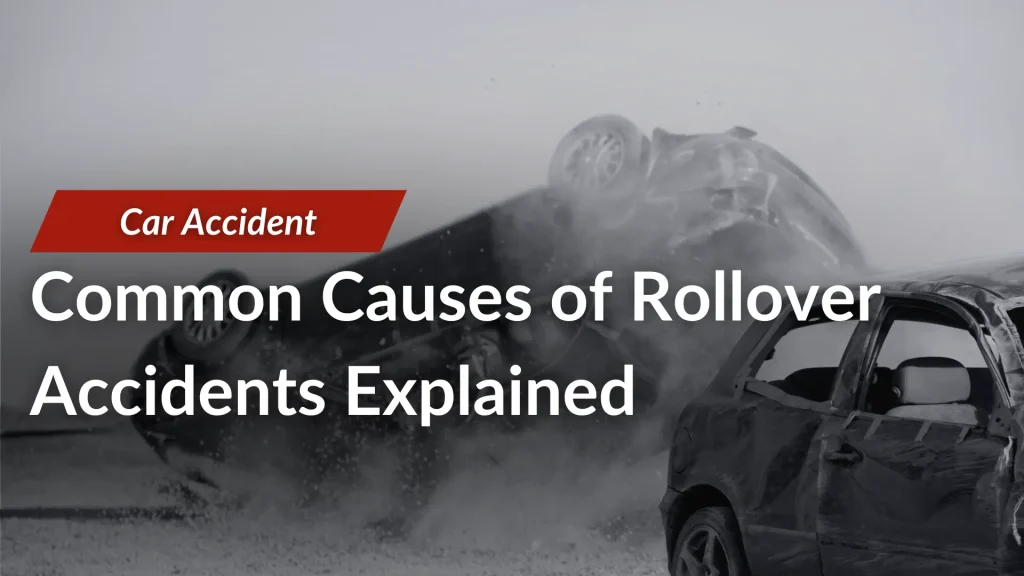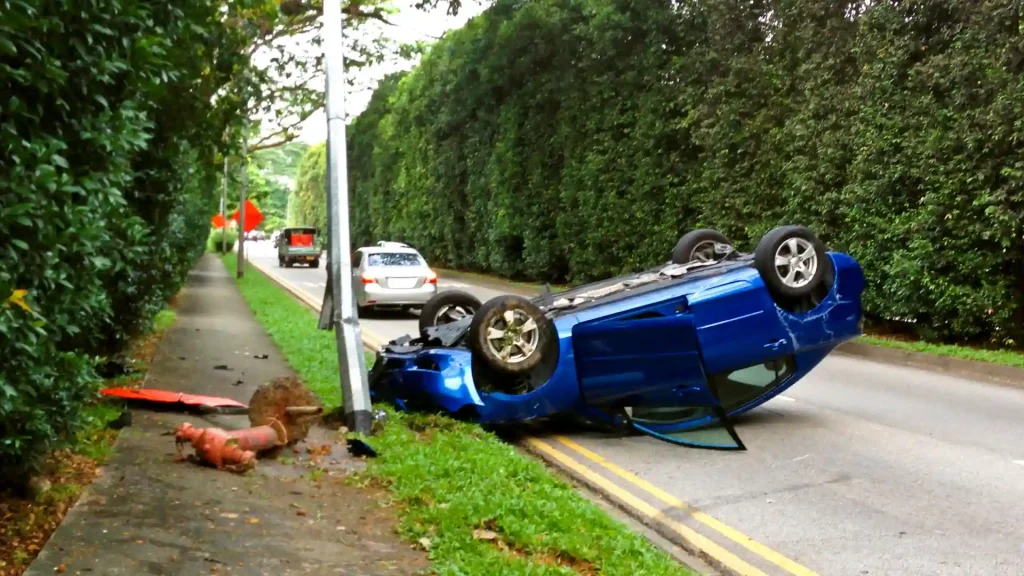
There are several types of car accidents, but rollover accidents are among the most deadly. According to an article in the Annals of Medical & Health Sciences Research, there are 200,000 rollover accidents in the US annually among light motor vehicles, and rollover accidents are responsible for nearly a third of all highway vehicle fatalities. Rollover accidents comprise only 2.2 percent of all motor vehicle accidents but are responsible for a third (33 percent) of injury costs. But what causes rollover accidents, and why are they so deadly?
Why Do Rollover Accidents Happen? Car Rollover Physics Explained
Rollover accidents happen when a force causes a car to flip at least 90 degrees onto its side and over onto its hood. In more technical terms, you can say that a rollover accident happens when the car’s center of gravity shifts position sufficiently far to either side of the wheelbase. This physical principle is why rollover accidents are more common in vehicles with a higher center of gravity.
You can divide rollover accidents into two main types, each differing based on the cause of the force that flips the car over.
Tripped Rollover Accidents
Tripped rollover accidents occur when an external force strikes a car and pushes it onto its side. The simplest example of a tripped rollover accident is a side collision. A significant t-bone collision with enough lateral force can make a car over its balancing point and cause it to flip upside down. Tripped rollovers can also occur when a car sliding sideways strikes a stationary object, such as a curb or soft section of the ground. In some cases, strong winds can cause a car to flip over.
Untripped Rollover Accidents
Untipped rollover accidents occur due to the interplay of internal forces acting on the vehicle, such as inertia, friction, and gravity. For instance, when a car moving in a straight line makes a sharp turn, the inertia and forward momentum can cause it to tip over on its side and start rolling. Similarly, driving sideways on a steep slope can cause the vehicle’s center of gravity to shift and flip the car upside down.
What Causes Rollover Accidents?
Rollover accidents often result from driver negligence, but can also occur due to vehicle defects. Below are some of the most common causes that can lead to rollover accidents.
Speeding
One of the most common types of behaviors that can lead to rollover accidents is speeding. According to a 2002 NHTSA report, about 40 percent of all fatal rollover accidents involved speeding, compared to 15 percent for fatal non-rollover crashes. Most rollover crashes take place on roads with speed limits higher than 55 mph.
Overcorrection
Drivers may also have to make sharp turns to avoid colliding with road debris, fallen cargo, or inattentive drivers who pull out in front of them. The aggressive swerving from an overcorrected turn can cause the driver to lose control and flip the car.
Aggressive Driving
Aggressive driving, like accelerating quickly, taking turns at high speeds, and swerving while shifting lanes, makes the driver more likely to flip sideways and start rolling. Other drivers may also have to swerve to avoid aggressive drivers, causing them to tip and roll.
Defective Auto Parts
In some cases, a rollover happens because of defective or malfunctioning vehicle parts. For instance, if a tire suddenly blows out or your brakes fail, you might lose control of the vehicle and flip over. If a rollover happens because of a defective auto part, the manufacturer may be liable for damages.
Road Dangers
Drivers might have to turn sharply to avoid road defects like potholes and damaged road sections. In these kinds of cases, the injured victims may be able to go after the municipality responsible for the road’s maintenance.
Factors That Affect the Likelihood of a Rollover Accident
Rollover accidents have a relatively simple physical explanation, but several factors determine their likelihood of occurring in any given instance.
- The faster a car is moving, the more likely a rollover accident. This is because vehicles with higher velocity have a larger lateral momentum that causes them to tip over.
- Car Height. Cars with taller designs, such as SUVs, trucks, and vans, typically have a higher center of gravity, so they are more likely to flip over when struck with sufficient lateral force. Conversely, cars with a lower center of gravity are less likely to roll over.
- Road Conditions. Various road conditions, such as road steepness, weather, or obstructions, can increase the chances of a rollover accident.
- Tractor Attachments. Cars with heavy tractor-trailers may be more prone to flipping during accidents. The additional momentum of a tractor-trailer can make vehicles more likely to tip after making sharp turns. If the tractor-trailer loses traction, it can fishtail and drag the vehicle down the road.
What Happens to Your Body in a Rollover Accident?

Rollover accidents are extremely deadly because of the violent, twisting motions the body undergoes as the car rolls. Victims can also sustain injuries from colliding with the interior of the car cabin. Even if they are wearing a seat belt, victims can sustain serious injuries, such as:
- Whiplash and neck injuries
- Spinal cord damage
- Concussion and traumatic brain injury
- Broken bones
- Crushing injuries
- Soft-tissue injuries
- Lacerations
- Burns or abrasions
In extreme scenarios, rollover accidents can eject the vehicle occupant from the cabin. Ejection from a vehicle happens when centrifugal force from the rolling motion throws an unsecured occupant away from the vehicle. A rollover can eject an occupant with sufficient force to cause extensive physical trauma when they strike the road or the nearby environment.
Car Accident Attorneys in Florida
Rollover accidents can cause catastrophic injuries that may have permanent, life-altering effects. If you have sustained injuries in a rollover accident due to a negligent driver or defective auto parts, you can pursue financial compensation for your losses. Our team is here to help you understand your rights and take the first step toward securing the necessary benefits. Contact Jurewitz Law Group Injury & Accident Lawyers online or call (619) 233-5020 today to speak to a Tampa car accident attorney about your case.
Related Post
Dealing with Tampa Insurance Companies after a Car Accident
How Long After a Car Accident Can You Claim Injury in California?


